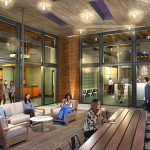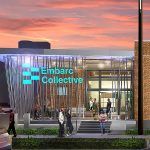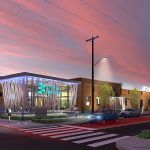Embarc Collective is gearing up to open its doors in the former District 3 Space in downtown Tampa in March.
The Tampa tech hub, backed by Tampa Bay Lightning owner Jeff Vinik, is largely inspired by 1871, a similar nonprofit organization in the Chicago area.
Lakshmi Shenoy, CEO of Embarc Collective, was recruited from 1871, bringing a wealth of experience and passion to the Tampa startup scene.
At 1871, Shenoy was second-in-command and gave Vinik a tour of the organization when he visited Chicago in 2016. “There was no motive on either side. I wasn’t applying for a job, he wasn’t interviewing me for job. It was really exploratory,” Shenoy says. “I gave him the playbook on ‘This is what we built in Chicago, this is how we did it, and this is what we achieved.’”
Named for the year of the Great Chicago Fire that burned for three days, killed approximatley 300 people, destroyed more than three square miles of the city and rendered more than 100,000 people homeless, 1871 was an answer to a question that Tampa business leaders have long have asked themselves, “How do we attract and retain talent to our region?”
“Chicago was experiencing a tremendous brain drain. You have the University of Illinois that produces probably [a higher] number of engineers than any other program. These engineers are so good, they are getting jobs on the West Coast, Boston and in New York, and Chicago was losing them,” Shenoy says. “We want to create opportunities so our kids want to come home after they’ve gone through their education, but that’s on us to be able to create those opportunities for them, to compel them to come home. 1871, for Chicago, was a step in that direction.”
In 2017, Vinik reached out to Shenoy and offered her the chance to establish something similar in Tampa. Shenoy knew no one in the area and had a very sick parent at home. To her, it was the worst time to think about relocating.
She said it was a lesson in being opportunistic and just saying “yes.”
She traveled to Tampa and met with Vinik’s team.
“I was so impressed with their thoughtfulness, their plan, their work ethic. Quite frankly, there aren’t teams out there that work as hard as they do,” Shenoy says. Now that the opening of Embarc’s home is a few weeks away, Shenoy is ready to get to work.
“I feel the community is really open to this kind of change. It’s hard to explain when it doesn’t exsist yet, but we have a new take on how to best support entrepreneurs in the community,” Shenoy says. “This new take is really [about] how do you put together the layers of support in a really curated and customized way, so every founder is getting only what they need and not everything.”
As of this writing, Embarc Collective is awaiting its nonprofit status, as it takes no equity in the companies it works with. Instead, it offers membership through a subsidized monthly fee, based on the size and needs of the company.
“It’s not about the organization of Embarc Collective,” Shenoy says.” If no one ever knows about the brand of Embarc Collective, but more so that Embarc Collective helped to create better conditions for startups to be successful in this region, and those startups become household names around the world, that’s the mission.”
From a startup perspective: COI Energy Services
Name: SaLisa Berrien, CEO
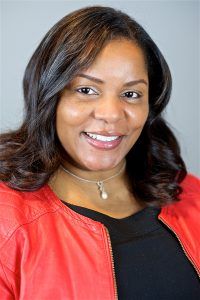
Location: Tampa
In a nutshell, what does your company do?
COI Energy helps electric utilities and its business customers reduce energy consumption, make money, and efficiently power the electric grid with flexible energy resources. «COI helps its clients Save Energy, Save Money, Save Time and Save the Environment.»
What was biggest challenge starting up your company?
My biggest challenge was finding technical talent that I could afford on a bootstrapped budget. The demand for developers is high, while supply is tight.
How can an organization like Embarc help?
What I particularly like about the Embarc model is that they get “It!” They understand what’s important to founders, so they have the solution or are in the process of securing a solution for things that are top of mind. I asked for help with securing developers, they responded immediately with resources. It is refreshing to have a partner that truly understands your challenges, but better yet they seek out ways to remove those barriers so we can focus on building a successful business.
What’s next for you?
Growth! We are looking to scale our business and expand our product lines. We started the business with addressing a cost/earnings problem for utilities using technology. We are now expanding into the core of the platform where we drive energy efficiency in buildings to optimize performance of the electric grid, reduce energy waste, reduce cost, reduce carbon emissions, and make money for the business owners with operational flexibility. Of course to do this in a big way, we must raise capital. We are looking to raise our Series A in second quarter 2019.
***
From a startup perspective: Professional Credentials Exchange (ProCredEx)
Name: Anthony Begando
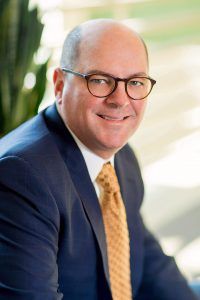
Location: Tampa
In a nutshell, what does your company do?
I am the co-founder and CEO of the Professional Credentials Exchange (ProCredEx). We are developing a marketplace for our members to trade verified credentials and occupational data between industrial counterparties. We are launching the exchange within the U.S. healthcare market in 2019. Credentialing has historically been a chronic impedance to employing/contracting clinical professionals within healthcare delivery organizations and insurance plans — with average cycle times exceeding four to six plus months from recruitment to completing enrollment with an organization’s insurance contracts. Our exchange enables organizations to both acquire verified credentials and sell their own credential verifications to others needing this information within a secure and highly reliable environment.
What was biggest challenge starting up your company?
Finding the right partners to launch the marketplace who understand the subject matter and can add significant value and scale to our early growth efforts. We have been very fortunate to have assembled a terrific strategic partner base and are working with over 20 partners.
How can an organization like Embarc help?
In building and growing any early-stage business, virtually all energy and resources must target go-to-market product/service development and building early adopter customers. We believe that working with Embarc will allow us to remain laser-focused on those areas.
What’s next for you?
Having self-funded ourselves over the last several years, we are in the throes of raising our first round of outside capital funding our industrial pilots and go-to-market readiness. We plan on launching pilots in the second quarter of 2019 and scaling the firm accordingly.

